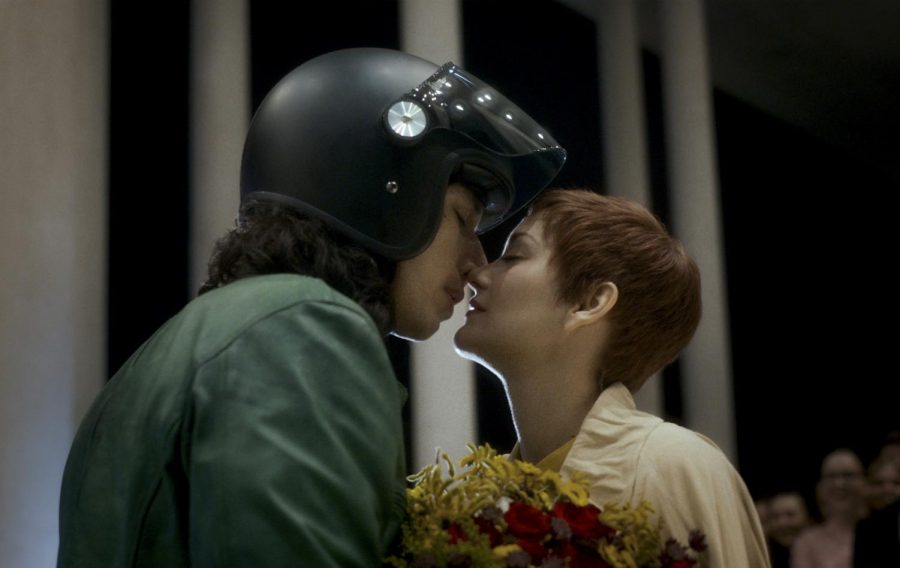Review: “Annette”
Directed by Leos Carax and written by Sparks, “Annette” is as weird as you’d expect. “Annette” is currently playing in theaters and available via Amazon Prime.
Starring Adam Driver and Marion Cotillard, “Annette” is a Rock Opera centered around a chaotic artistic couple. “Annette” is now in theaters and Amazon Prime. (Image courtesy of Amazon Studios)
August 19, 2021
“Annette” is deranged. Adapted from a screenplay by odd bod duo Sparks — Ron and Russell Mael — and directed by Leos Carax, “Annette” is the first true rock opera since “The Lure” and the only movie with a musical number about giving birth (which just to happens to feature musical cunnilingus as a bonus.)
Assuredly more Sparks than Carax, “Annette” is a film about a tumultuous artistic couple and their miraculous marionette baby chanteuse. The leading couple is comprised of Ann Desfranoux (Marion Cotillard), a sensational opera singer, and Henry McHenry (Adam Driver), a scary version of Bo Burnham. Despite being deeply in love with one another, their bliss is temporary before one of their careers soars whilst the other’s plummets. Therefore, “Annette” displays the agony of artistic jealousy, showing how frustration turns to alcoholism before being transformed into murderous intent.
With its over-the-top performances and crescendoing series of unfortunate events, “Annette” embodies the stylings of an opera. Combine that with the bombastic nature of Sparks’ script and songwriting and you’ve got yourself a true rock opera, a work bursting with emotion, full of wild characters, harboring surreal imagery and rich with catchy riffs. With “Annette,” Carax has constructed an harmoge of madness, a paean to goofiness and just about the most uproarious thing to assault theaters since they shut down last year.
These bizarre albeit brilliant touches of peculiar eccentricity are demonstrated perfectly by Driver’s performance. The following paragraph will be devoted to listing the eccentricities Adam Driver demonstrates in “Annette.”
Driver rocks a pencil-stache that gets progressively more disgusting over the course of the film. Driver drives a motorbike across a solemn highway in the middle of the California desert shrieking like a madman. Driver sleeps in a baby crib; imagine his long, silly legs stretching past the tiny, wooden ribs of the crib. Driver plays at being a playboy, parading around nightclubs in a fedora. Driver utters phrases like “Will I ever be lovable again?” Driver harbors a size-morphing birthmark. And, last but not least, Driver thanks Chris Rock in the credits for some unknown reason. In sum, Driver has never been stranger or sexier.
This genius manifests itself across the entire cast. Cotillard is fantastic as Desfranoux, imbuing the character with a sense of heightened mortality salience that exaggerates the ephemeral qualities of her role and makes every moment that she graces the screen all the more resonant. And then, there’s Simon Helberg, as The Conductor, who offers an honest performance full of lovelorn sentiments and symphonic passion.
Outshining all of them is the eponymous Annette, whose characterization benefits from not actually being played by a human for most of the film. It’s a hilarious approach that tests the limits of empathy and curiosity, as Carax forces the viewer to emotionally attach themselves to an inanimate object that simultaneously oozes love and creepiness. Once Annette finds herself singing and soaring through the air, plush monkey in hand, audiences will swoon.
That the aforementioned weirdness all succeeds is a testament to Carax’s talent as a filmmaker. Subduing his own directorial tendencies, Carax finds a way to make the chaos of Sparks’s script work, providing their vision with the distinctive aesthetic wonder that permeated his previous film, “Holy Motors!”
“Annette” is deranged, but it’s also a marvel. It features the best use of marionettes since “Being John Malkovich” and has so much green, it might as well be dubbed a mossy film. But, for all its stylistic excess, it offers something unseen, something original: a euphoric experience of atypical strangeness, an opera for the postmodern age.
Contact Nicolas Pedrero-Setzer at [email protected]

























































































































































